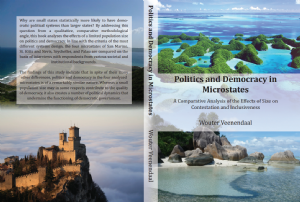Wouter van Veenendaal ~ Politics And Democracy In Microstates. A Comparative Analysis Of The Effects Of Size On Contestation And Inclusiveness
 What this Dissertation is About
What this Dissertation is About
According to several recent publications, small states or microstates are comparatively more likely to have democratic systems of government than larger states (Diamond and Tsalik 1999; Anckar 2002b; Srebrnik 2004). Based on the data of aggregate indices of democracy such as Freedom House, these large-N quantitative analyses have disclosed a statistically significant negative correlation between population size and democracy. Although a satisfactory explanation of this pattern has not yet been found, the argument that a limited population size fosters good governance, republicanism, and democracy was already formulated by the ancient Greek philosophers, and is therefore one of the most ancient debates in political science. The finding that microstates from around the globe are exceptionally likely to develop and maintain democratic systems of government therefore appears to validate centuries-old theories about the political consequences of size. In addition, not only has the average population size of countries continuously been decreasing since the late 19th century (Lake and O’Mahony 2004), but more and more states have initiated programs of decentralization and devolution of powers and competences to smaller, sub-national units. This unmistakable trend towards smaller polities and administrations is buttressed by academic publications that emphasize the virtues and advantages of smallness (cf. Schumacher 1973; Katzenstein 1985; Weldon 2006).
Full text (PDF): https://openaccess.leidenuniv.nl/bitstream/Veenendaal.pdf